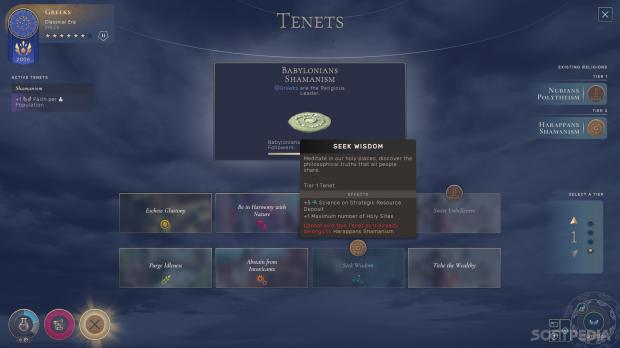What’s the winning move in a strategy game? Is it careful use of the military? Should the player focus on economic development? Should gamers research all tech as fast as possible? These are all questions 4X fans know well and the fun in the genre lies in finding new ways to answer them. Humankind adds an entirely new one: can choosing the best mix of civilizations be the perfect way to ensure victory?
The game was created by Amplitude Studios and is published by SEGA, via Steam on the PC. This is a turn-based strategy experience that that wants to hit all the 4X core mechanics while delivering unique elements to create competition for the Civilization series.
The main concept is the same: take charge of a political entity and guide it through history. Players can control unit movement, they will decide what a city will build and how it will develop, will choose which technologies to research, and the kind of social policies that they plan to implement. All of this will be familiar to any fan of the genre and all the systems work well with each other.
The twist that defines Humankind is that you do not play as one civilization but move through them as history progresses. The game starts during the Neolithic, with a small tribe that has limited options. Once the Ancient period rolls around each player will choose his first faction, based on his play style and the bonuses he feels make the most sense.



Gamers should also become familiar with Fame. They accumulate it by hitting milestones based on gameplay, but they get more of it if they tailor their approach to match the capabilities of their chosen faction. Get seven stars in one era and you can move to the next, choosing another historical civ to work with. But you can linger in a chosen period if you want to get more Fame because the total amount you have when the game ends is the only thing that matters.
Combining traits, buildings and unique bonuses is a cool idea and it gives players ways to pivot based on circumstances. I tend to start off with a science-based civ, then move towards a little expansionism and then choose based on rival factions and on the strategic demands of that particular game.
The combat system is an evolution of the one Amplitude pioneered in Endless Legend. The player can create stacks and when they meet, they enter a turn-based battle that uses the terrain around them. I like the concept and it creates some good, quick mini-games but I still end up auto-resolving most of the engagements.
Humankind is less developed when it comes to diplomacy and faith elements. Interacting with AI factions feels very empty, and most wars are fought to the end. Religions are very simple, though they can offer lead to some bonuses that stack very well with particular civ choices. The social choices are better implemented and can have bigger impacts, synergizing well with other decisions.
I would advise anyone who has played a 4X before to quickly drop out of the campaign that the developers basically push gamers into when they first launch the title. It basically introduces a version of the game that’s unexciting and very easy. Get back to the menu (which might involve a crash or two) and then pick the largest possible map with as many rivals as possible. The difficulty is up to you. The game needs interactions and competition to feel interesting and faction choice only matters when there are plenty of others to potentially snap up cool combos.
The AI in Humankind is competent, especially when it gets difficulty-based bonuses, when it comes to city development and expansion. It seems less capable when it comes to warfare (mainly because it does not concentrate forces) and fails to maximize Fame. But it feels like it puts up more of a challenge than it does in Civilization VI.
Humankind has a good presentation, with a major focus on making information easy to see and understand. Players can zoom in to see beautiful cities and good-looking units. But I suspect most veterans will stay zoomed out, with hex and tile resources enabled, drinking in as much info as possible. The interface is well-designed and easy to use, which is a big plus for this genre. The music and voice work are adequate but after 10 hours I muted the game and put on some classical tracks.



The Good
- Picking civilizations for new eras
- City development system
- Focus on Fame
The Bad
- Focus on Fame
- Limited diplomacy and faith systems
- Some technical issues
Conclusion
The main selling point, moving through civilizations as history progresses, creates plenty of potential for cool stories, overpowered empires, and surprising twists. But the overall experience sometimes feels like less than the sum of its parts. Amplitude has such a reputation for creating unique civilizations and mechanics that I expected more. The team clearly aims to quickly bring aboard anyone who has played a recent Civilization title.
It has succeeded in that and in creating a very competent strategy experience, but I sometimes wished for Humankind to aim for more innovation and more surprises. I hope that their next title will try to deliver a competitor for the classic Alpha Centauri, unleashing their creativity and their world-building capabilities.
Review code provided by the publisher.
 14 DAY TRIAL //
14 DAY TRIAL // 























